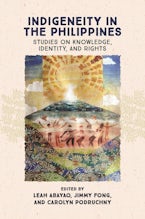In the Philippines, the concept of Indigeneity is deeply intertwined with colonial history, a pattern echoed across the globe. Yet, its manifestation in the Philippines bears distinct features. The Philippine Indigenous Peoples’ Rights Act of 1997 identifies as Indigenous groups who resisted colonization. Today the Philippines recognizes approximately 110 diverse Indigenous ethnic groups that are made up of 14–17 million people. This book aims to show how discussions of Indigeneity in the Philippines can contribute to the conversation about global Indigeneity by highlighting the distinct circumstances of the Philippines.
The fourteen essays in this volume are divided into four sections: Defining Indigenous Peoples and their Rights, Indigenous Knowledge, Colonialism, and Making Identities. The interdisciplinary essays touch on Indigenous peoples throughout the Philippines and beyond to diasporas. Most of the essays are rooted in northern Luzon in the Cordillera region, reflecting the field’s strength. A variety of theoretical insights emerge in the volume, but a common thread is each essay’s firm grounding in specific people, places, and processes, and the critical reading of source materials. The twenty-four contributors teach us that Indigeneity in the Philippines is a complex and evolving identity brought to national attention by the hard work of Indigenous communities.
In the Philippines today, Indigenous peoples continue to negotiate their rights, affirm their presence, and advocate for their concerns. Indigenous knowledge has been flourishing in epistemologies, rituals, stories, books, and educational structures. This volume of essays on Indigeneity in a nation that is known for its support of Indigenous groups is one of the first of its kind for Southeast Asia.

